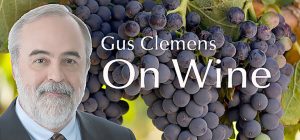After 17 years of communicating to readers as a newspaper wine columnist with a side gig online, the ground shifted, the medium and the stylistic conventions of the message changed.
As a newspaper writer, the style leaned toward formality and objectivity, even though a newspaper column is more personal than a formal newspaper story. For instance, in the beginning of the column’s life, when I expressed an opinion not supported by facts or other sources beyond my personal perspective, the convention was to phrase it as “in this wine writer’s opinion.” A bit arch, yes, but it followed the canon of objective news writing.
As the column evolved, I became more comfortable with the grammatical first person: use of subject pronouns—I, me, mine, myself, my. By that time, the column had become a discussion with readers rather than a news story about wine. There was more freedom, but there remained awareness that as a newspaper wine columnist, my first job was to inform people about wine. If I entertained them as part of the formula, well and good. But entertainment and personal discourse was value added, not Job One. My primary assignment was to interest people in wine, a product sold by supermarkets and wine-liquor stores advertising in the paper, thus paying for the newspaper and my work.
In 2024-2025 there was a sea change in newspaper wine writing. In major publications such as the Washington Post, the Oregonian, the Seattle Times, the Los Angeles Times, and my position as nationally syndicated by Gannett/USA Today in hundreds of smaller newspapers ended. Declining newspaper circulation and resulting budget cuts and declining wine sales were the reasons. It was a cold-water-in-the-face reminder that nothing lasts forever.
Fortunately, during the 17-year newspaper run I invested in establishing an online presence. First at my website, which I controlled, and on Facebook, which was easy. Then came Twitter/X, Substack, Linkedin, Bluesky, Apple podcasts, and Vocal. These initially existed as adjuncts to the print work. Today, they are my only platforms.
Writing to my online audience is different from writing for a newspaper reader. Online is more intimate and personal. After all, the online audience is engaged with me and my work without distractions of other coverage. The newspaper writing was, in part, to provide editorial content to support advertising. Particularly in the beginning, my column anchored the front page of the “Food Section” of the newspaper, chock full of ads from grocery stores and wine and liquor stores that sold wine.
Now my work stands alone. You come to it because you want to be entertained and educated by my content of words and pictures. You made a conscious decision to click on the specific link or open the email. You did not just open a newspaper thrown on your front lawn. The online medium is more intimate. The connection is more a conversation with a friend—in the case of the podcasts, an actual verbal communication. I am comfortable with the new challenges.
The change also affects the dynamics of creation. Gone is the tyranny of a 450-word requirement to fill a specific space in a print hole. Gone is the tyranny of a weekly deadline—in my case, I submitted all four or five of a month’s columns together at one time at least a week prior to the first column’s deadline. Frazzled editors loved that, but it meant I wrote weeks ahead of publication.
I intend to strive to post every week, but now I can slide if exigencies interrupt or opportunities present for more than once a week. And, beyond columns, there remains my near-daily tasting notes, plus the extra bonus wine time humor material. My trepidation is providing you with too much content.
If you have read this far, I thank you for being part of our wine and humor adventure together. The online platform you are reading or listening to is my only communications link. I would appreciate your help in recruiting others who you believe might enjoy or be entertained. Hit the “share” button or mention me in a chat or email. Almost all content is free and signing up is made as easy as possible—as is unsubscribing if things don’t click.
I’ll be seeing you on the internet.
Tasting notes:
• Ricardo Santos Bodega y Viñedos Tercos Malbec, Mendoza, Argentina 2022: Amiable, soft-tannin, red fruit expression of Mendoza malbec. No palate challenges, depth, or complexity, but easy choice when you want an affordable, no-drama dram. $14-15 Link to my review
• La Mascota Vineyards Unánime Chardonnay, Argentina 2022: Consistently good value that blends Old and New World approaches to chardonnay. Not sharp and angular, also not a buttery fruit bomb, reasonable alcohol (13.5%). $15-22 Link to my review
• Domaine St. Laurent Rosé de Pinot Noir Block One Rouge Valley, Oregon 2023: Delicate, elegant, showcases light red fruits. Versatile, easily can be enjoyed on its own or paired with lighter fare. $25 Link to my review
• Ricci Curbastro Franciacorta Brut NV DOCG: Textbook Franciacorta—balanced, elegant, refreshing, clean. Classic quality from Italy’s premier bottle-fermented wine region. $38-47 Link to my review
• Grgich Hills Estate Chardonnay, Napa Valley 2021: Delightful celebration of Napa fruit and winery skill by makers that put Napa chardonnay on the world map. Crunchy, full bodied, delicious from a vintage that encouraged ripeness and depth. $45-50 Link to my review
• McGrail Vineyards Graduate Cabernet Sauvignon, Livermore Valley 2019: Burly example of dark fruit Livermore Valley cab. Not for everyone, but works for those who crave a take-no-prisoner bold red to pair with hunk of sizzling beef fresh off the grill. $65 Link to my review
Last round: A truck loaded with thousands of copies of Roget’s Thesaurus crashed yesterday losing its entire load. Witnesses were stunned, startled, aghast, taken aback, stupefied, confused, shocked, rattled, paralyzed, dazed, bewildered, mixed up, surprised, awed, dumbfounded, nonplussed, flabbergasted, astounded, amazed, confounded, astonished, overwhelmed, horrified, numbed, speechless, perplexed.
Wine time.


